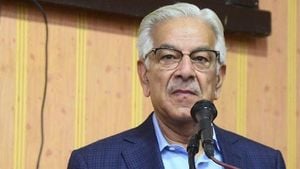As tensions escalate between India and Pakistan, the specter of conflict looms larger than ever, with both nations on high alert following a series of military confrontations. Recent events have reignited fears of a large-scale conflict, especially after India conducted airstrikes on terror camps in Pakistan in retaliation for the deadly Pahalgam attack that killed 26 people on April 22, 2025.
Pakistan's military response has involved missile and drone attacks targeting various regions in India, including Jammu, Rajasthan, and Punjab. However, these attacks were swiftly countered by India's air defense systems, which intercepted several incoming missiles. Reports indicate that Indian fighter jets shot down a Pakistani F-16 and potentially two JF-17 aircraft during these exchanges.
The backdrop of this military escalation is Pakistan's fragile economic situation. The country, which was on the brink of bankruptcy in 2023, has only recently begun to stabilize, largely due to a $7 billion bailout from the International Monetary Fund (IMF) and support from the World Bank. However, experts warn that continued military engagement with India could jeopardize this recovery. Pakistan's external debt has soared past $131 billion, and its foreign-exchange reserves stand at a precarious $10 billion, barely covering three months of imports.
In stark contrast, India boasts a robust economy, currently the fifth largest in the world, with a GDP that is 10.5 times that of Pakistan. This economic disparity raises questions about Pakistan's ability to sustain prolonged military hostilities. Analysts suggest that the economic fallout from such a conflict would be significantly more damaging for Pakistan than for India.
Adding to Pakistan's woes, India has imposed a comprehensive ban on all imports from its neighbor, including indirect imports through third countries. This ban is expected to have a substantial economic impact, particularly on commodities worth an estimated $500 million that were previously imported from Pakistan. An official noted that this ban will enable customs authorities to prevent Pakistani goods from entering India through circumvention.
As the situation escalates, the IMF is set to review a proposed $1.3 billion loan for Pakistan during a crucial board meeting on May 9, 2025. India's Executive Director at the IMF is expected to oppose this loan, citing Pakistan's continued support for terrorism as a significant concern. The ongoing conflict could jeopardize Pakistan's access to external financing and pressure its already strained foreign-exchange reserves.
Global credit rating agencies have also weighed in, with Moody’s warning that escalating tensions with India could hinder Pakistan's economic growth and fiscal consolidation efforts. Meanwhile, S&P Global Ratings has highlighted the risks posed to both nations' credit metrics due to the ongoing conflict.
On the ground, the repercussions of this military escalation are being felt acutely. Pakistan's stock market has plunged by around 9% in recent days, reflecting investor fears over the potential for sustained conflict. In contrast, Indian markets have remained relatively stable amidst the turmoil.
In response to the heightened tensions, Indian authorities have initiated various emergency measures. The Ministry of Home Affairs has requested state governments to invoke emergency powers for procurement of essential goods and services. Air raid sirens are being tested in Delhi as part of preparedness drills, and heightened security measures have been implemented at airports across the country.
Local governments in border areas have also taken precautionary steps, including the closure of markets and the enforcement of blackouts to minimize visibility during potential attacks. In Jammu and Kashmir, Chief Minister Omar Abdullah has visited hospitals to assess the situation following shelling by Pakistani forces.
Former Jammu and Kashmir Chief Minister Mehbooba Mufti has called for political intervention, emphasizing that military action alone cannot resolve the underlying issues between the two nations. She expressed deep concern for the innocent civilians caught in the crossfire, stating, "Military action treats symptoms, not the root cause. It never provides a solution or peace."
In a show of solidarity, various political leaders and celebrities in India have praised the armed forces for their efforts in safeguarding the nation. Cricketer Virat Kohli and actress Anushka Sharma have publicly expressed their gratitude to the military for their sacrifices during these trying times.
As the conflict continues to unfold, both nations find themselves at a crossroads. The need for diplomatic dialogue is more pressing than ever, with calls for de-escalation echoing from various quarters. Pakistan's Defence Minister has indicated that the country is in talks with Saudi Arabia, Qatar, and China to seek a resolution to the ongoing crisis.
In conclusion, the current situation between India and Pakistan remains precarious, with the potential for further escalation looming. As military actions continue, the economic implications for Pakistan are profound, raising critical questions about its ability to sustain a prolonged conflict with a far stronger adversary. The international community watches closely, hoping for a peaceful resolution to a conflict that has persisted for decades.




